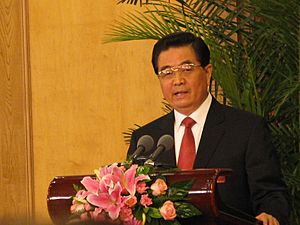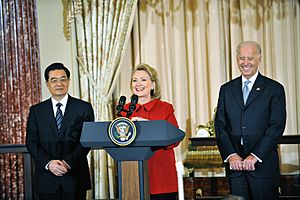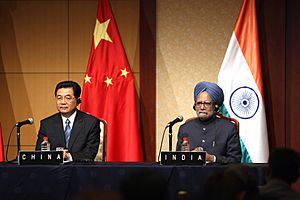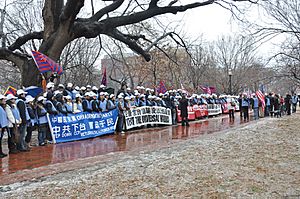Hu Jintao facts for kids
Quick facts for kids
Hu Jintao
|
|||||||||||||||||||||||||||||||||||||||||||||||||||||||||||||
|---|---|---|---|---|---|---|---|---|---|---|---|---|---|---|---|---|---|---|---|---|---|---|---|---|---|---|---|---|---|---|---|---|---|---|---|---|---|---|---|---|---|---|---|---|---|---|---|---|---|---|---|---|---|---|---|---|---|---|---|---|---|
|
胡锦涛
|
|||||||||||||||||||||||||||||||||||||||||||||||||||||||||||||
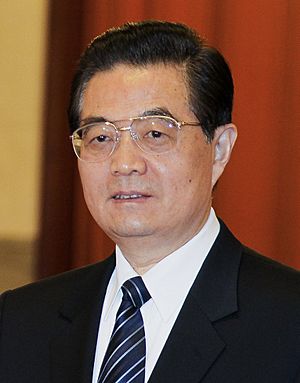
Hu in 2011
|
|||||||||||||||||||||||||||||||||||||||||||||||||||||||||||||
| General Secretary of the Chinese Communist Party | |||||||||||||||||||||||||||||||||||||||||||||||||||||||||||||
| In office 15 November 2002 – 15 November 2012 |
|||||||||||||||||||||||||||||||||||||||||||||||||||||||||||||
| Preceded by | Jiang Zemin | ||||||||||||||||||||||||||||||||||||||||||||||||||||||||||||
| Succeeded by | Xi Jinping | ||||||||||||||||||||||||||||||||||||||||||||||||||||||||||||
| President of China | |||||||||||||||||||||||||||||||||||||||||||||||||||||||||||||
| In office 15 March 2003 – 14 March 2013 |
|||||||||||||||||||||||||||||||||||||||||||||||||||||||||||||
| Premier | Wen Jiabao | ||||||||||||||||||||||||||||||||||||||||||||||||||||||||||||
| Vice President |
|
||||||||||||||||||||||||||||||||||||||||||||||||||||||||||||
| Preceded by | Jiang Zemin | ||||||||||||||||||||||||||||||||||||||||||||||||||||||||||||
| Succeeded by | Xi Jinping | ||||||||||||||||||||||||||||||||||||||||||||||||||||||||||||
| Chairman of the Central Military Commission | |||||||||||||||||||||||||||||||||||||||||||||||||||||||||||||
In office
|
|||||||||||||||||||||||||||||||||||||||||||||||||||||||||||||
| Deputy |
|
||||||||||||||||||||||||||||||||||||||||||||||||||||||||||||
| Preceded by | Jiang Zemin | ||||||||||||||||||||||||||||||||||||||||||||||||||||||||||||
| Succeeded by | Xi Jinping | ||||||||||||||||||||||||||||||||||||||||||||||||||||||||||||
|
|||||||||||||||||||||||||||||||||||||||||||||||||||||||||||||
| Personal details | |||||||||||||||||||||||||||||||||||||||||||||||||||||||||||||
| Born | 21 December 1942 Taizhou, Jiangsu, China |
||||||||||||||||||||||||||||||||||||||||||||||||||||||||||||
| Political party | CCP | ||||||||||||||||||||||||||||||||||||||||||||||||||||||||||||
| Spouse | Liu Yongqing | ||||||||||||||||||||||||||||||||||||||||||||||||||||||||||||
| Alma mater | Tsinghua University (BS) | ||||||||||||||||||||||||||||||||||||||||||||||||||||||||||||
| Profession | Hydraulic engineer | ||||||||||||||||||||||||||||||||||||||||||||||||||||||||||||
| Signature |  |
||||||||||||||||||||||||||||||||||||||||||||||||||||||||||||
|
Central institution membership
1992–2012: 14th, 15th, 16th, 17th Politburo Standing Committee
1992–2002: Secretary (first-ranked), 14th, 15th, Central Secretariat 1992–2012: 14th, 15th, 16th, 17th Politburo 1985–2012: 12th, 13th, 14th, 15th, 16th, 17th Central Committee 1982–1985: 12th Alternate Membership of the Central Committee 1988–2013: 7th, 8th, 9th, 10th, 11th National People's Congress Other offices held
1999–2005: Vice Chairman, State Central Military Commission
1999–2004: Vice Chairman, Party Central Military Commission 1998–2003: Vice President of China 1993–2002: President, Central Party School 1988–1992: Party Committee Secretary, Tibet Autonomous Region 1985–1988: Party Committee Secretary, Guizhou province 1983–1985: First Secretary, Communist Youth League 1983–1985: President, All-China Youth Federation the People's Republic of China |
|||||||||||||||||||||||||||||||||||||||||||||||||||||||||||||
| Hu Jintao | |||||||||||||||||||||||||||||||||||||
|---|---|---|---|---|---|---|---|---|---|---|---|---|---|---|---|---|---|---|---|---|---|---|---|---|---|---|---|---|---|---|---|---|---|---|---|---|---|

"Hu Jintao" in Simplified (top) and Traditional (bottom) Chinese characters
|
|||||||||||||||||||||||||||||||||||||
| Simplified Chinese | 胡锦涛 | ||||||||||||||||||||||||||||||||||||
| Traditional Chinese | 胡錦濤 | ||||||||||||||||||||||||||||||||||||
|
|||||||||||||||||||||||||||||||||||||
Hu Jintao (born 21 December 1942) is a Chinese politician. He served as the top leader of the Chinese Communist Party (CCP) from 2002 to 2012. He was also the President of China from 2003 to 2013. From 2004 to 2012, he led China's military as the Chairman of the Central Military Commission.
Hu was a member of the CCP Politburo Standing Committee, which is China's main decision-making group, from 1992 to 2012. He was considered China's fifth paramount leader during his time in office.
Hu became powerful within the CCP. He was a Party Secretary in Guizhou province and the Tibet Autonomous Region. His actions to maintain order in these regions brought him attention. He then became vice president under Jiang Zemin. Hu was the first leader of the Communist Party from a younger generation. Important older leaders like Song Ping, Hu Yaobang, Deng Xiaoping, and Jiang Zemin helped him rise quickly.
During his time as leader, Hu brought back some government control over parts of the economy. He was careful with political changes. With Premier Wen Jiabao, Hu oversaw almost ten years of strong economic growth. This growth made China a major world power. He wanted to make society more fair through his "Scientific Outlook on Development" idea. This aimed to build a "Harmonious Socialist Society" that was rich and peaceful. Under his leadership, the government also dealt with social unrest and protests. In foreign policy, Hu promoted "China's peaceful rise". He focused on soft power and working together with other countries. China's influence grew in Africa, Latin America, and other developing areas.
Hu was known for his quiet and careful leadership. His time in office involved leaders working together and making decisions by agreement. This made him a bit of a mystery to the public. When he retired after ten years, he was praised for leaving all his positions willingly. His government focused on skilled experts. Xi Jinping took over from him. After Jiang Zemin passed away, Hu is the only living former top leader of China. He was the last top leader born before the People's Republic of China was founded.
Contents
Early Life and Education
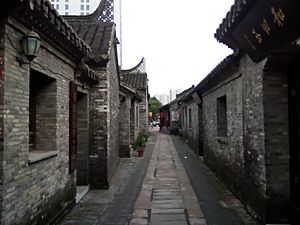
Hu Jintao was born on December 21, 1942, in Tai County, Jiangsu province. At that time, the area was under Japanese control. His family came from Jixi County, Anhui. His father had a small tea business, but the family was not rich. His mother was a teacher and died when he was seven. An aunt raised him. During the Cultural Revolution, his father was criticized. This event deeply affected Hu, and he worked hard to clear his father's name.
He joined the Chinese Communist Party (CCP) in April 1964. That same year, he graduated from Tsinghua University. He studied hydropower stations there. He then worked as a political advisor at Tsinghua. In July 1965, Hu started working as an engineer. In 1968, he volunteered to work in Gansu province. He helped build the Liujiaxia Hydroelectric Station. He also managed CCP matters for the local water and power ministry. From 1969 to 1974, he worked for Sinohydro Engineering Bureau.
In 1970, Hu married Liu Yongqing. They met at Tsinghua University. They have two children, Hu Haifeng and Hu Haiqing. Hu enjoys table tennis and ballroom dancing. People say he has a very good memory, which was clear even when he was in high school.
Early Political Career
In 1973, Hu moved to the Construction Department of Gansu as a secretary. The next year, he was promoted. In 1980, Deng Xiaoping started a program to find younger, more educated, and specialized communist leaders. Song Ping, a top official in Gansu, noticed Hu Jintao. He promoted Hu several times. Wen Jiabao, another person Song Ping supported, also became important around this time.
In 1982, Hu became the secretary of the Communist Youth League in Gansu. He also became the director of the All-China Youth Federation. His mentor, Song Ping, moved to Beijing. Song Ping was in charge of recommending and promoting senior officials. With support from Hu Yaobang (no relation) and Deng Xiaoping, Hu's future in the party looked bright. Hu was invited to Beijing to study at the Central Party School. Soon after, he moved to Beijing and joined the leadership of the Communist Youth League. Two years later, he became the top leader of the Youth League. During this time, Hu traveled with Hu Yaobang, who was then the CCP general secretary.
Leading the Party in Guizhou
In 1985, Hu Yaobang helped Hu Jintao move to Guizhou. There, he became the top Party leader for the province. Hu tried to improve the economy of this less developed province. He reportedly visited all eighty-six of its counties. In Guizhou, Hu was careful to follow Beijing's instructions. He was known for not sharing his own opinions on policy in public. While people saw Hu as honest, some preferred the previous leader. In 1987, Hu Jintao handled student protests in Guizhou carefully. Similar protests in Beijing led to Hu Yaobang losing his position.
Time in Tibet
In 1988, Hu Jintao was sent to the Tibet Autonomous Region. He became the Party leader there and also a military leader. This made him the most powerful person in this large, sometimes troubled region. Many Tibetans had long disagreed with government policies. Unrest and ethnic tensions were growing. Small clashes had happened since 1987. When the unrest grew, Hu sent police to Lhasa in February 1989 to prevent more trouble. Increased clashes led to serious riots in Lhasa on March 5, 1989. This was five days before the 30th anniversary of the 1959 Tibetan uprising. The protests were stopped the next day. Hu asked Beijing to declare martial law on March 8.
Hu's exact role in the events of March 5 was not fully clear. It is generally understood that he approved the use of force. However, whether he gave direct orders throughout that day is debated. Some experts connected Hu's actions in Lhasa to the later events in Tiananmen Square three months later. When the government took action in Tiananmen Square, Hu was one of the first regional leaders to publicly support the central government.
Hu experienced altitude sickness in June 1990 and returned to Beijing. He stayed in his Tibet role for two more years but achieved little. His return to Beijing was seen as a way to get back to the center of Chinese politics.
Rise to Power
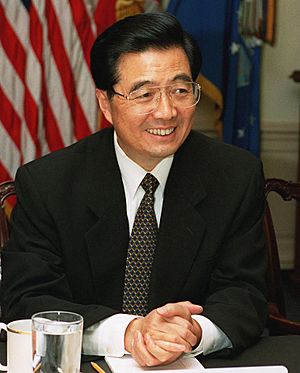
Before the 14th National Congress of the CCP in 1992, senior party leaders chose new members for the CCP Politburo Standing Committee (PSC). This was to ensure a smooth transfer of power. Deng Xiaoping also wanted a younger leader for the future. Song Ping suggested Hu as a good choice. So, just before his 50th birthday, Hu Jintao became the youngest member of the seven-person Politburo Standing Committee. He was one of the youngest PSC members since the Communist Party took power in 1949.
In 1992, Hu became a key member of the Secretariat of the Chinese Communist Party. This group managed the daily work of the CCP Central Committee. He also led the Central Party School, which helped him gain support from other senior CCP officials. Hu was also in charge of the CCP's ideas and messages. Even though Hu was seen as the future leader after Jiang, he always made sure Jiang was the main focus. In 1998, Hu promoted Jiang's "Three Stresses" movement. In 2001, he helped spread Jiang's "Three Represents" theory. In 1998, Hu became vice president. Jiang wanted Hu to be more involved in foreign affairs. Hu became China's main voice during the United States bombing of the Chinese embassy in Belgrade in 1999.
Leadership
Taking Over from Jiang
On November 15, 2002, after the 16th National Congress of the Chinese Communist Party, Hu Jintao became the CCP general secretary. This made him the top leader of China. Wen Jiabao became the premier. However, Jiang Zemin was re-elected as chairman of the Central Military Commission, the top military body. Jiang resigned from this military role in September 2004. After Jiang stepped down, Hu officially held the three main positions of power in China: leading the party, the state, and the military.
Even though Jiang, then 76, stepped down from his party roles, some thought he would still have a lot of influence. This was because Hu was not part of Jiang's powerful group of supporters. However, later events showed that many of Jiang's supporters changed their positions. For example, Zeng Qinghong became a link between the two groups.
Hu was mostly careful with political changes during his time. In early 2006, Hu started the "Eight Honors and Eight Shames" movement. This aimed to encourage good morals among people. At the 17th CCP National Congress, Hu was re-elected as general secretary and military commission chairman in October 2007. He was also re-elected as president in March 2008.
Domestic Policies
SARS Crisis
The first big challenge for Hu's leadership was the SARS outbreak in 2003. China was criticized for not sharing information quickly. Hu then removed several officials, including the health minister and the Mayor of Beijing.
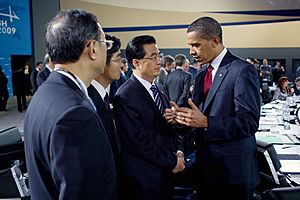
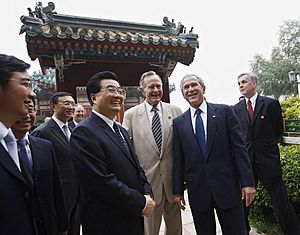
Economic Changes
Hu and Wen Jiabao took a more careful approach to economic changes. They started to reverse some of Deng Xiaoping's earlier reforms in 2005. The government adopted policies that aimed for more fairness for everyone. They increased support for healthcare and education. They also stopped some privatization and used a flexible money policy.
The government invested a lot in state-owned companies. This helped these large companies compete with foreign businesses. Under Hu, the government helped state-owned companies grow and combine. This sometimes made it harder for private companies to compete. However, the number of state-owned companies continued to decrease. The value of China's currency, the yuan, also became more flexible. It rose by 31% against the U.S. dollar from 2005 to 2012. China's economy grew by about 10% each year under Hu. China's economy became larger than those of the United Kingdom, France, Germany, and Japan.
Hu and Wen wanted to create a "Harmonious Society". This meant reducing inequality and focusing less on just economic growth. They paid attention to people who had not benefited from economic changes. They visited poorer areas of China to understand their needs. Hu and Wen also tried to balance economic growth with social fairness and environmental protection. However, their efforts to control the economy faced resistance from some powerful groups.
Media
Hu believed in guiding public opinion, especially online. He said the Party should "control online discussions" and "increase positive coverage." He wanted to use new technologies to promote a positive message. He also said China should strengthen both traditional and new media.
Hong Kong
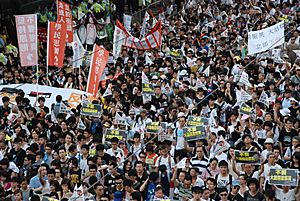
Foreign Policy
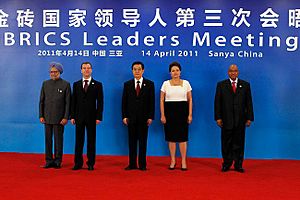
Under Hu, China continued its approach of using diplomacy to support its development. China's actions on the world stage were generally practical and predictable. Hu promised that China would seek peaceful development in a harmonious world. This was to assure other countries that China's growth was good for everyone. His foreign policy focused on building a world where countries could have different ways of developing. It also supported different cultures and rejected one country dominating others.
In 2006, Hu explained China's foreign policy goals:
- Big powers were key.
- Neighboring countries were a priority.
- Developing countries were the foundation.
- Working with many countries was important.
In 2009, Hu called for stronger arms control at the United Nations. He supported U.S. President Barack Obama's calls for a world without nuclear weapons. Throughout Hu's time, China worked more closely with countries in the Global South. He tried to improve relations with Japan, visiting in 2008. He reduced the importance of relations with Russia due to unfulfilled agreements.
Hu emphasized "shared responsibility" in international relations. China would help with global issues. However, it would not do anything that hurt its main interests. Its promises depended on what other nations did. Experts say that under Hu, China was a "reluctant rising power." It chose carefully which global duties to take on.
Taiwan
Early in his leadership, Hu faced a leader in Taiwan (Republic of China) who wanted independence, Chen Shui-bian. Chen wanted talks without conditions, rejecting a previous agreement. Chen and his party continued to seek formal independence for Taiwan. Hu's first response was a mix of "soft" and "hard" approaches. He was open to discussing many issues with Taiwan. But he still refused talks without conditions. He remained committed to Chinese unification as the final goal. While Hu showed some flexibility, his government was firm. It would not allow Taiwan to declare formal independence.
After Chen was re-elected in 2004, Hu's government changed its approach. It stopped direct contact with Taiwan due to Chen's independence goals. The government continued to build up its military against Taiwan. It also worked hard to isolate Taiwan diplomatically. In March 2005, the Anti-Secession Law was passed. This law stated that China could use "non-peaceful means" if Taiwan declared independence.
Hu's government increased contact with the Kuomintang (KMT). This was China's former enemy in the Chinese Civil War. The KMT was still a major party in Taiwan. These contacts led to a historic meeting between Hu and KMT chairman Lien Chan in April 2005. This was the first meeting between the leaders of the two parties since World War II.
On March 20, 2008, the Kuomintang, led by Ma Ying-jeou, won the presidency in Taiwan. Hu immediately adopted a softer approach. This led to better relations between the two sides. A series of important meetings between the CCP and KMT followed. On April 12, 2008, Hu Jintao met with Taiwan's vice president-elect Vincent Siew. On May 28, 2008, Hu met with KMT chairman Wu Po-hsiung. This was the first meeting between the heads of the CCP and KMT as ruling parties. They agreed to restart official talks based on the "1992 Consensus." This meant both sides agreed there was "only one China," but could disagree on what that meant. Wu promised Taiwan's new government would not seek independence. Hu promised to address Taiwan's concerns about security and international standing.
In December 2008, the two sides agreed to restart the "Three Links". This meant reopening mail, trade, and direct air travel. Relations remained friendly during Hu's time. Trade grew a lot, leading to the signing of a trade agreement in 2010.
Transition to Xi
On November 15, 2012, after the 18th CCP National Congress, Xi Jinping was elected to lead the CCP and the military. He took over from Hu. On March 14, 2013, Xi also became president, succeeding Hu.
After Retirement
Since retiring, Hu has mostly stayed out of the public eye. He rarely makes public appearances. In September 2013, Hu visited his family's ancestral home in Huangshan, Anhui. This trip was not reported by state media. In April 2014, he appeared in Hunan, visiting Hunan University. He attended the 19th CCP National Congress in October 2017. He also attended the 70th anniversary of the People's Republic of China in October 2019. In July 2021, he attended the 100th anniversary of the Chinese Communist Party.
20th Communist Party Congress
At the closing ceremony of the 20th CCP National Congress on October 22, 2022, Hu was seen being escorted out of the hall. This happened before the votes that day, and Hu was not present for them. China's official news agency, Xinhua, stated that Hu was not feeling well. Foreign news outlets wondered if he was truly sick or if it was a political message. The event was not shown in China, and Hu's name was blocked by Chinese censors.
Jiang Zemin's Funeral
After Jiang Zemin passed away, Hu was named to the funeral committee. Hu Jintao appeared in public with Xi Jinping on December 5, 2022. He attended the farewell ceremony before Jiang's body was cremated. An aide accompanied him.
Legacy and Impact
Hu led China during a decade of strong economic growth. He guided China through the 2008 financial crisis with little harm. He greatly increased China's standing in the world. Under Hu, China modernized its infrastructure. It launched its first crewed space mission. It also hosted two successful international events: the 2008 Beijing Olympics and the 2010 Shanghai Expo.
Also, Hu's "soft approach" to Taiwan, along with a new government in Taipei, improved relations between mainland China and Taiwan. Trade and contact between them grew a lot. Hu and Premier Wen Jiabao's policies helped ordinary people. They removed agricultural taxes for farmers. They made policies more flexible for migrant workers. They also worked for more balanced development and affordable housing. The government's response to the SARS crisis and the expansion of health insurance were praised. These policies were generally well-received by the Chinese public.
In foreign policy, some critics say Hu's government was too aggressive. They say it worried neighboring countries like India and Japan. It also caused tension with the United States. Critics within China pointed to problems like the growing gap between rich and poor. They also noted that China's internal security spending grew. The Hu government's focus on state-owned companies led some to believe he missed a chance for deeper economic changes.
Hu's efforts against corruption had mixed results. While there were attempts to make government spending more open, deep-rooted problems remained. A large corruption scandal in the military after Hu left office showed he could not fully tackle these issues. In his farewell speech, Hu warned about the dangers of unchecked corruption. Also, Hu's government was criticized for limiting freedom of speech. Artists and writers felt more restricted. Although Hu tried to encourage more participation within the party, there was little real change to how decisions were made.
Decision-making by agreement became a key feature of Hu's time. Hu was not a single powerful leader. He was seen as one among equals with his Politburo Standing Committee colleagues. Some called China's politics under Hu "nine dragons taming the water." This meant nine PSC members each had their own area of influence. Hu also faced many special interest groups and political groups within the party. The influence of former leader Jiang Zemin also limited his power. Despite this, Hu was praised for being a good mediator and for building agreement. He also won praise for stepping down as military chief and general secretary. This was seen as a message that older leaders should retire and not interfere with their successors. His government was known for focusing on skilled experts.
Political Ideas
Scientific Outlook on Development
Experts say Hu's political ideas were different from his predecessor's. Hu's main ideas were a "Harmonious Socialist Society" at home and "Peaceful Development" abroad. The "Harmonious Society" was supported by the Scientific Development Concept. This idea aimed to solve economic, environmental, and social problems together. It also recognized a need for careful political changes. The Scientific Outlook on Development became part of the CCP and State Constitutions in 2007 and 2008.
Hu believed these ideas created a new "China Model" of governance. This model combined strong economic growth, a lively private sector, strict political control, personal freedoms (but not political ones), care for all citizens, and cultural development. He saw it as a good alternative to Western democracy, especially for developing countries. Hu said a "Harmonious Socialist Society" should have democracy, fairness, justice, honesty, friendship, and energy. He believed such a society would let people use their talents and share in the wealth.
Some believe Hu's Scientific Outlook on Development led to China's focus on low-carbon development. Western critics often focused on human rights under Hu. However, they sometimes overlooked his efforts to address China's many social problems. Hu's practical approach had two main goals: keeping society stable for economic growth and preserving Chinese culture. In domestic policy, he seemed to want more openness in government. China's news agency started publishing more details about Politburo Standing Committee meetings. He also stopped some traditional lavish ceremonies for leaders visiting other countries. The Chinese leadership under Hu also focused on problems like the gap between rich and poor. They also addressed uneven development between different regions. Both the party and state began to define development more broadly. It included social equality and environmental effects, not just economic growth.
In June 2007, Hu gave an important speech. He spoke in a way that appealed to ordinary Chinese people. He talked about the challenges China faced, especially income differences. He also mentioned the need for "increased democracy" in the country.
Moral Guidance
To address social problems in China, Hu Jintao released the "Eight Honors and Eight Shames" in March 2006. This was a set of moral rules for Chinese people to follow. He stressed the importance of teaching these rules to young people. These "Eight Honors and Disgraces" were eight short lines. They described what a good citizen should see as honorable and what to see as shameful. This was seen as Hu's way to deal with a perceived lack of morals in China. After economic reforms, many Chinese focused mainly on money and power.
It is common for Chinese communist leaders to add their own ideas to Marxist theory. Whether this was Hu's contribution is debated. However, the public's reaction was moderate. These rules were promoted widely. They appeared on classroom posters, street banners, and electronic displays for the 2008 Olympics and 2010 Shanghai Expo. These rules were different from those of previous leaders. They focused on moral standards, not just social or economic goals.
Awards and Honors
- Colombia:
- Grand Cross of the National Order of Merit (January 21, 1997)
- Cuba:
- Member of the Order of José Martí (November 23, 2004)
- Jordan:
- Grand Cordon of the Supreme Order of the Renaissance (January 14, 2001)
- Madagascar:
- Grand Cordon of the National Order of Madagascar (January 25, 1999)
- Pakistan:
- Recipient of the Nishan-e-Pakistan (November 24, 2006)
- Peru:
- Grand Cross of Order of the Sun of Peru (November 19, 2008)
- Turkmenistan:
- Member of the Order of Saparmyrat Türkmenbaşy the Great (August 29, 2008)
- Ukraine:
- Member 1st Class of the Order of Prince Yaroslav the Wise (August 31, 2010)
See also
 In Spanish: Hu Jintao para niños
In Spanish: Hu Jintao para niños
 | Victor J. Glover |
 | Yvonne Cagle |
 | Jeanette Epps |
 | Bernard A. Harris Jr. |


